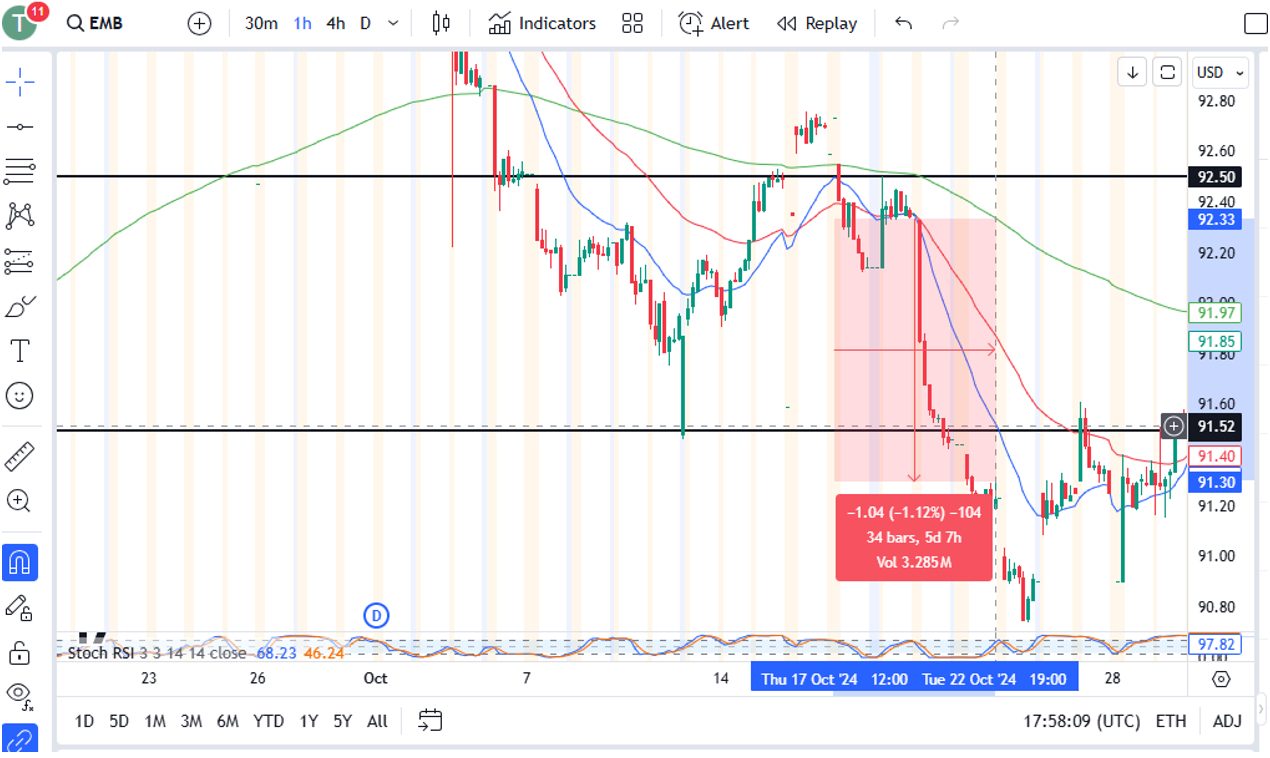CFD Trading In Jamaica



Are you a Jamaican interested in trading contracts for difference, or CFDs? You’ve come to the right place.
An evolving regulatory landscape overseen by Jamaica’s Financial Services Commission (FSC), a developing stock market (Bloomberg rated the Jamaican Stock Exchange the best-performing exchange in 2018), and high-leverage opportunities make CFDs attractive.
In this beginner’s guide to CFD trading in Jamaica, we’ll unpack taxes, regulations, and tradable instruments before taking you through a detailed trade from start to finish.
Quick Introduction
- A CFD is an agreement between you and your broker to exchange the difference in price, say shares in Jamaica Teas, from when you open and close the trade.
- CFDs are popular with day traders because they are derivatives where you don’t own the underlying asset but can speculate on both rising and falling prices.
- CFDs are complex, high-risk investments, and leverage can magnify gains and losses. They should be traded by experienced investors. Beginners should start with a demo account.
- While financial trading is overseen by Jamaica’s Financial Services Commission (FSC), limited local industry regulations mean CFDs can carry a higher risk than other derivatives.
- Profits from active CFD trading may be subject to income tax rates starting from 25%, with payments due to the Tax Administration of Jamaica.
Best CFD Brokers In Jamaica
Through personal tests, we've pinpointed these 4 CFD providers as the best for traders in Jamaica:
How Does CFD Trading Work?
Trading CFDs means you could trade shares in a top-performing Jamaican company, such as Wigton Windfarm (a green energy company that provides clean and renewable energy solutions, including wind and solar energy), on the Jamaican Stock Exchange (JSE) without actually owning the stock.
Rather than buying shares in the company, you could trade a CFD to speculate on price movements and go long (if you think the price will rise) or short (if you think the price will fall) and potentially profit from rising and falling prices.
Unlike in heavily regulated regions like Europe and Australia, where leverage is limited to 1:30, or 30x, your initial investment, Jamaica has no such restrictions.
This means you can supercharge your returns even further, sometimes up to 1:1000, or 1000x, and above, but it also seriously increases the risk of whopping losses. For this reason, we recommend beginners tread carefully and avoid highly leveraged trading.
What CFDs Can I Trade In Jamaica?
Depending on their broker, Jamaicans may be able to access various CFDs spanning global markets:
- Index CFDs such as the JSE All Jamaican Composite (JSEAJC), which measures the performance of Jamaican companies listed on the JSE, and the JSE Top 40 Index, which comprises the top 40 companies on the JSE by market capitalization. Alternatively, the US Dow Jones, Germany’s DAX 40 or the UK FTSE 100 are more widely available.
- Forex CFDs on major currency pairs such as EUR/USD, GBP/USD, and USD/CAD and minor and exotic currency pairs. If supported on your trading platform, you may also be able to trade the Jamaican dollar (JMD) in pairs like GBP/JMD or EUR/JMD, though be wary of wide spreads and slippage issues that could impact the profitability of short-term trading strategies.
- Stock CFDs covering some of the best-performing Jamaican stocks, such as A.S. Bryden & Sons Holdings (ABSH), Barita Investments (BIL), Transjamaican Highway (TJH), and NCG Financial Group (NCBFG). You can also trade stocks from major hubs like the US, Europe and Asia for superior liquidity and trading costs.
- Commodity CFDs for energy (gas, oil), livestock (cattle, hogs), metals (gold, silver, platinum, and copper), plus softs (sugar, coffee and cocoa remain important exports for the Jamaican economy).
- Exchange-traded funds (ETFs) with Jamaican exposure, such as AEMB – American Century Emerging Markets Bond ETF, GEMD, Goldman Sachs Access Emerging Markets USD Bond ETF, and JPMB – JPMorgan USD Emerging Markets Sovereign Bond.
- Crypto CFDs such as Bitcoin, Ethereum, Tether, and altcoins can be bought as a straightforward way to speculate on the rising interest in digital assets without the complexities of storing and securing crypto tokens.
Is CFD Trading Legal In Jamaica?
Yes, CFD trading is legal in Jamaica, but you must follow the rules laid down by the Financial Services Commission (FSC) and the Bank of Jamaica (BoJ).
The FSC, in particular, plays a key role in overseeing Jamaica’s financial services and online trading with a mandate to protect retail investors, ensure market integrity, and regulate financial intermediaries.
However, the regulatory framework is still evolving and there are limited rules that specifically govern CFD trading, potentially raising the risks.
CFD traders in Jamaica can invest with confidence and limit potential risks such as fraud or loss of capital, provided they exercise caution and choose a regulated provider that is transparent and segregates funds.
Is CFD Trading Taxed In Jamaica?
CFD traders in Jamaica may be obliged to pay tax on their profits, much like most of the Caribbean and the wider world.
While Jamaica has no capital gains tax, individuals are generally liable to income tax starting from 25%, levied by the Tax Administration of Jamaica.
Jamaican residents and domiciled individuals are taxed on their worldwide income, while non-resident individuals are taxed on Jamaican-sourced income.
A Trade Example
To show you how CFD trading in Jamaica can play out, here is an example of a short CFD trade of iShares J.P. Morgan USD Emerging Markets Bond ETF.
Technical Analysis
As a technical trader, I prefer the momentum bounce strategy for day trading.
A momentum bounce strategy involves buying a security when its price rises or falls to a support level and then buying or selling it when it shows signs of reversing.
The goal is to profit from short-term corrections or “bounces.” Using the 20-day moving average as a support or resistance level, I go long or short when price action rebounds off or breaks this indicator.
I use stochastics, the 200, 50, and 20-day simple moving averages, and trend lines to analyze trends and identify support and resistance levels and time trades.

Trade Entry
With price action on the daily, 4-hour, and 1-hour timeframes in an established downtrend, I marked out established and tested levels with horizontal trend lines to plot my entry and exit points.
Dropping down to the 1-hour chart to get a tighter entry, I waited for the first bearish candle to break through the 20-day moving average and close before entering the trade at 92.30 and setting my take profit order at 91.50.
Trade Exit
I monitored my trade closely on the 1hr, 4hr, and daily timeframes.
My trade played out as planned, and my take-profit order kicked in, leaving me to exit the CFD trade as planned.
Rule number one for any serious trader is to protect your account. I calculate the position size according to my own rules, never risking more than 1% of my account balance and setting a stop-loss order to manage possible losses.I always review my plan after every trade, note any lessons learned, and tweak my strategy for future CFD trades.
Bottom Line
CFD trading in Jamaica can give you easy access to a wide range of financial markets.
Keep in mind that CFDs are high-risk instruments, so make sure you are comfortable using leverage, which can amplify both your profits and losses.
Always stick to your trading plan, know your limits, and never risk money you cannot afford to lose.
Lastly, make sure you use a reputable broker, so your investments are protected, and be careful to comply with Jamaican tax laws.
To get moving, see DayTrading.com’s choice of the top CFD platforms for day trading.
Recommended Reading
Article Sources
- Jamaica's Financial Services Commission (FSC)
- Bank of Jamaica (BoJ)
- Tax Administration of Jamaica
- Jamaican Stock Exchange (JSE)
The writing and editorial team at DayTrading.com use credible sources to support their work. These include government agencies, white papers, research institutes, and engagement with industry professionals. Content is written free from bias and is fact-checked where appropriate. Learn more about why you can trust DayTrading.com



